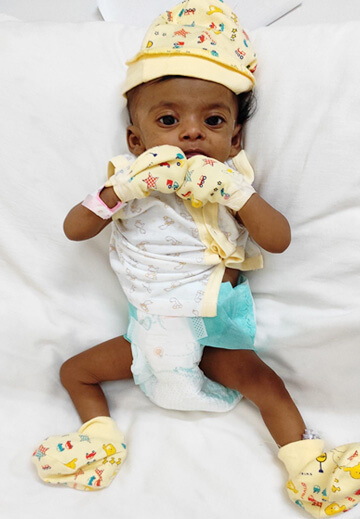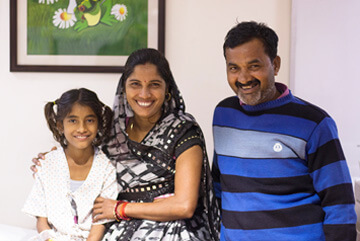Children with Congenital Heart Defects can lead a healthy and happy life
February 25, 2022 | Contributed by Jathin Ramesh, Priyasha Anand, Shania Mohapatra, Sera Cerejo, Ragini Chauhan
Children with Congenital Heart Defects can lead a healthy and happy life
More than 200,000 children are born with Congenital Heart Defects (CHDs) in India every year. Over 70,000 of these are critical cases, that need immediate medical intervention for the child’s survival. While the rest may require treatment or medications depending on the type of defect, age of the children etc. Due to a lack of awareness and access to quality healthcare, many kids either succumb at an incredibly young age or may develop complications as and when they grow up, if the underlying CHD (Congenital Heart Defects) is not treated. Therefore, early diagnosis and treatment is essential for child heart treatment.
What is a Congenital Heart Defect and how does it develop?

If an infant has congenital heart defect, it means that the child is born with it and the defect hampers the normal functioning of the heart. There are various kinds of CHDs, where some congenital heart defects are simple and do not need treatment. However, other congenital heart defects are complex and require multiple surgeries over several years for proper child heart treatment. The general types of CHD in children are the occurrence of holes in the heart chambers. In certain kinds of holes there is mixing of pure and impure blood which leads to less saturation in the body and to treat them children need hole in heart treatment.
Congenital heart defects occur when the heart’s normal development is disrupted. Most cases are thought to arise when something interferes with the heart’s growth during the first six weeks of pregnancy. This is the stage during which the heart transforms from a simple tube-like structure to a more completely formed heart. While some factors are known to raise the risk of congenital heart disease, the majority of the cases have no evident explanation.
Leading a healthy life with a CHD
With advancements in medical care and modern hole in heart treatment available in today’s age, children diagnosed with CHD can lead longer and healthier lives.
Ongoing Medical Care
Children with CHD need to get regular screenings to check for any complications that may hinder the overall development of the child. Furthermore, it also helps parents make healthier choices for their children moving forward. Depending on the type of CHD one is diagnosed with, doctors may recommend medicines and other forms of recurring medical care. Transitioning into adult life, some people may not need constant medical support as their heart defect might be cured. On the other hand, many face aggravated heart problems for which various medical invasive procedures might be recommended for addressing any health issues.
Nutrition
Most children diagnosed with CHD tend to burn more calories, it is due to the defect that the body’s metabolism increases. After subsequent treatment, doctors usually advise on following a balanced diet for holistic development.
Physical Activity

Indulging in physical activities can help the child in maintaining a healthy lifestyle and contribute to the strengthening of the heart. Promoting child development through toys, objects etc that contribute to an overall development of the child’s physical and mental well-being is especially important. Special clinics designed to nurture these experiences are available to promote the same. For example, physiotherapists can guide better in understanding which activities are safe and what should be avoided for the safety of the child with a heart defect.
Ongoing assistance overtime helps improve the condition of children with heart defects, but one should stay mindful. It is essential to go for regular check-ups that may help discover any potential problems which can be tackled at an earlier stage and help children lead a happy and healthy life.
References
https://www.medicalnewstoday.com/articles/184130
https://www.cdc.gov/ncbddd/heartdefects/living.html

